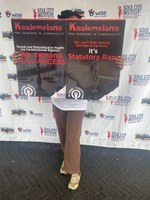
International Safe Abortion Day: Inclusive and Affirming Language About Abortion Is Essential

This was a result of high mortality rates, particularly among black women, who turned to unsafe methods of termination during Apartheid. A review of national data indicates that abortion mortality dropped by more than 90% between 1994 and 2001. Within the first three years of passing the Act in South Africa, services were incorporated into both private and public settings, leading to 40,000 legal terminations occurring per year.
Despite South Africa having one of the world’s most progressive legal frameworks for abortion, many women and girls – especially those in the poorest and most marginalised communities – struggle to access safe abortion services today.
As we join the global health movement in campaign activities for International Safe Abortions Day, which takes place annually on 28 September, the Soul City Institute reflects on how language impacts abortion access at different intersections.
After 27 years of advocating for the health rights of marginalised groups, we are concerned by the lack of abortion access reported by girls, women and gender diverse persons, through horrifying accounts of their experiences in the public health system. Moreover, our engagements with young people have enabled us to capture their knowledge, views and realities in relation to their sexual and reproductive health rights.
We therefore find that it is crucial to adopt non-stigmatising language when discussing abortion access, to create an open and affirming dialogue that considers the diverse experiences and choices of individuals. Non-stigmatising language helps to remove the societal shame and judgment often associated with the decision to terminate a pregnancy, enabling individuals to feel empowered and supported.
Safe Abortions Save Lives
The Sesotho term “ho qhala mpa” which directly translates to “throwing out the stomach” is an example of affirming language that is accessible to us. The over intellectualisation and politicisation of abortion has led us to believe that it is something far removed from the black experience. However, to “abort” or “terminate” refers to a voluntary ending of the process of pregnancy. Out of the recognition that one might not be physically, mentally, economically, or for any other reason (all of which are valid) fit to see the process through. Hence our mother tongues speak of the dispersing of a stomach, and not a “baby”.
In our SRHR workshops in TVET colleges, we have observed how divided the room gets when we discuss abortion myths and misconceptions. There’s always a significant number who express support for abortion, especially in the case of rape. While on the other hand, there are those who are adamant that abortion is murder. What is most interesting is the number of these young people who are surprised to learn that abortion is in fact legal, and that being pregnant doesn’t mean that you must be a mother. Shame has no place in something that is protected by our Constitution, and one’s fear of saying “I had an abortion” leads to another’s fear of saying “I want an abortion”.
Patriarchy has been so successful in over-sexualising and reducing feminine bodies to child bearers, that nobody even bats an eyelid when a 10-year-old presents as pregnant at a clinic. Lack of safe abortion access is directly linked to the high number of unintended pregnancies caused by statutory rape.
Not wanting a child is as natural as wanting one. But the choice to terminate is never brought up as an option for anyone because “children are a blessing from God”. At the Soul City institute, we believe in the law and find it hard to believe that the Constitution would permit the murder of children. Studies have found that most people who have had safe abortions report feeling relieved rather than guilty. Meanwhile, approximately 3 million girls aged 15 to 19 undergo unsafe abortions globally. For those living on the intersections of race, class, gender, sexuality, disability and nationality, affirming healthcare is a matter of life or death.
We believe that an intersectional approach to abortion access will ensure that no one is left behind, which is why it is important to expand our perspective beyond the gender binary. Abortion is not something that is relevant in heteronormative dynamics alone, and this belief is the reason why trans and intersex persons are the most affected by abortion stigma.
In every aspect of our society, we need to be aware of how overlapping identities reinforce oppression, particularly in our fight for bodily autonomy and self-determination. By choosing words and phrases that are neutral and unbiased, we can avoid imposing moral or ideological judgments on others. Such language promotes empathy, and the recognition of the complex and personal nature of decisions surrounding pregnancy termination.
Not only do we celebrate the right to abortion, but we also call on all stakeholders to adopt inclusive and affirming terminology that will contribute to a more compassionate and informed society, where reproductive health issues are discussed without judgment or shame.
For media queries
011 771 7973
disruptingpatriarchy@soulcity.org.za
